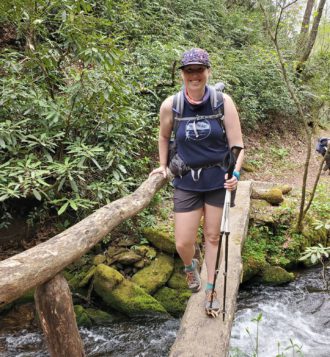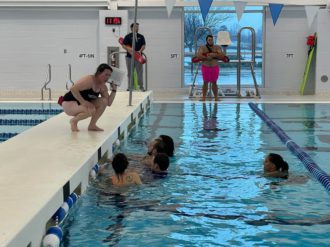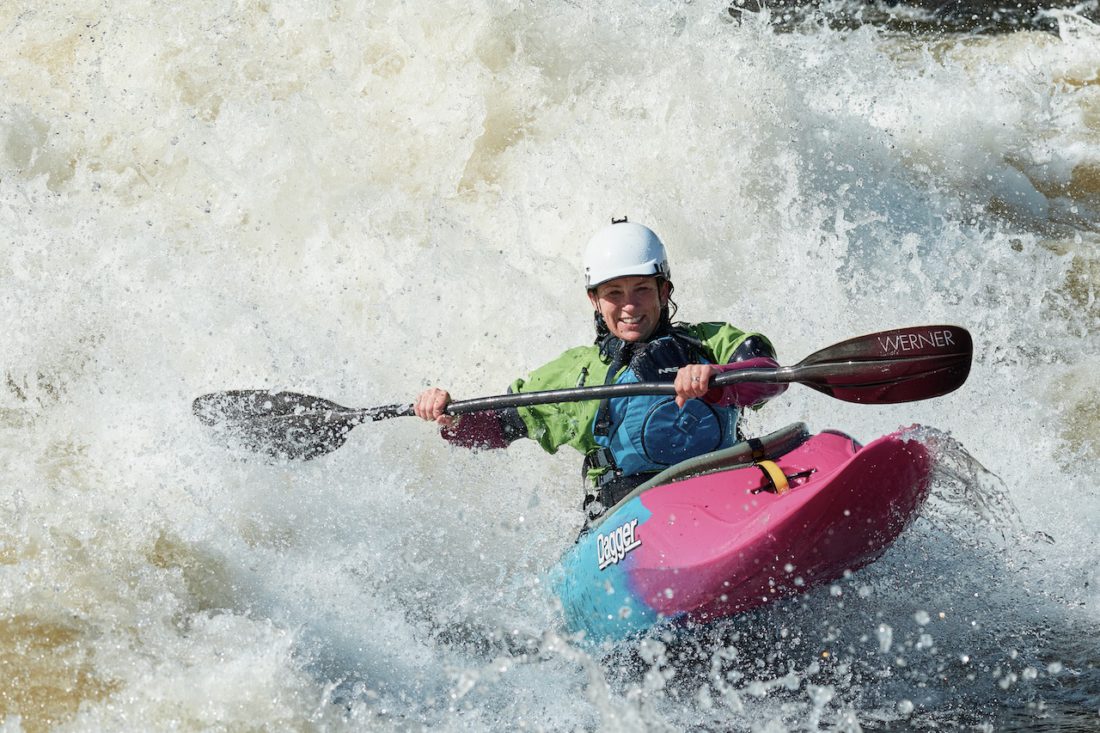Anna Levesque planned to go to law school. Lindsey Barr studied to be an aerospace engineer. Ruby Compton thought she would end up in the music business.
But the 9-to-5 office life wasn’t for these women, each of whom discovered a passion for the outdoors that changed their career trajectories. They are all now business owners and leaders in Western North Carolina’s outdoor recreation industry.
“When I went rafting for the first time, I just was so blown away by the power of the river and how folks in that industry really prioritize joy and connecting with nature,” says Levesque, a whitewater kayaking and paddleboarding instructor who owns Asheville’s Mind Body Paddle. “At a certain point, I was kayaking and rafting so much it turned into my career.”
Levesque and the others want to make rafting, hiking and other outdoor activities more inclusive. Despite improvements in recent years, they say challenges — and outdated attitudes — still exist.
“Our vision is that the trail is there for everyone at every phase of life,” says Barr, who bought Blue Ridge Hiking Co. in February. “The company started as a way to help people who are traditionally underrepresented in the outdoors, specifically women, feel welcome and gain more experience.”
Trail boss
Barr has a long history with outdoor recreation. She earned the Gold Award, the highest achievement of the Girl Scouts of the USA, while she was in high school in Winston-Salem. She also joined a Venturing Crew, a coed program of the Boy Scouts of America.
“I started backpacking, canoe camping and doing a lot more cycling and rock climbing,” she says. “I always loved it, but I still didn’t intend to do it professionally.”
While earning her bachelor’s and master’s degrees in aerospace engineering from N.C. State University, she worked for the school’s outdoor adventure program as a hiking and backpacking guide.
But it wasn’t until she started working as an engineer that she realized what she really wanted to be doing.
“I had some personal stuff going on and just needed to step away,” she says. “And when I did that, I realized the last time I was happy at work was when I was guiding.”
She took a job with an outdoor retailer in Winston-Salem in 2012 and ended up managing one of its stores in Eastern North Carolina. In January 2019, she became manager of Blue Ridge Hiking Co., which was looking to open a storefront in downtown Asheville after a decade as an online company offering guided hikes in Pisgah National Forest, Great Smoky Mountains National Park, Dupont State Forest and other places.
Barr helped launch the company’s store on College Street and its Appalachian Trail-er bunkhouse and gear rental location in Hot Springs.
When Blue Ridge Hiking founder Jennifer Pharr Davis offered Barr the chance to buy the business last year, she leaped at the opportunity. She wanted to make sure the company stayed true to its roots as a business serving women interested in the outdoors, she says, even though it has plenty of male clients.
Barr says women face unique challenges when participating in outdoor recreation. For instance, she says, until recently backpacks and other hiking gear were designed for men’s bodies. The same goes for rock-climbing instruction.

“A lot of traditional techniques and gear rely on upper body strength, and women’s bodies just don’t have that same kind of strength,” she says. “So, learning to climb with my core and my legs, which are much stronger than my arms, just opened up a whole world to me.”
And while things have gotten better, she says women still face significant challenges when participating in outdoor recreation.
“Particularly right now, we’re seeing a lot of conversation around things like sexual assault and sexual harassment, and that’s really scary,” she says. “I talk to a lot of women, and the fear about backpacking alone is not animals or falling off a cliff. It’s men on the trail.”
That’s one reason the company offers women’s backpacking trips every month and why many female clients prefer to work with women guides, she says. But there are other reasons, including being more comfortable talking to female guides about dealing with menstruating or peeing in the woods.
Julie Jenkins of Greenville, S.C., became a client of Blue Ridge Hiking a few years ago. She says she has been happy with the company’s male and female guides but has been particularly impressed with Barr, who was her guide for a three-day wildflowers and waterfalls backpacking trip in Great Smoky Mountains National Park.
“She’s so grounded, and she’s just really smart. She has so much experience and knowledge that you absolutely feel safe.”
Happy camper
Like Levesque and Barr, Compton found her life’s calling during a college summer job, even if she didn’t know it at the time. While studying the music business at Middle Tennessee State University, she worked at a summer camp.
She graduated from college in 2007, just in time for the Great Recession. Music industry jobs were scarce, but jobs at camps weren’t. Compton ended up as director of Green River Preserve, a coed summer camp in Transylvania County.
“A lot of hours and a lot of time and a lot of your energy and heart goes into working in summer camp,” she says. “It’s generally a job for young people. I got to a point where I got burned out and needed to step back.”
In 2018, she founded Ruby Outdoors, a Penrose-based business that provides training and support for the area’s many summer camps and outdoor programs. That includes training in CPR, wilderness first aid and lifeguarding.

“Running a camp is a big job. There’s a lot to do to train staff to be ready to take care of a bunch of kids,” she says.
Ruby Outdoors also teams with businesses like Blue Ridge Hiking Co. and with companies that have nothing to do with the outdoors, including a Brevard architectural firm. After Damar Hamlin of the NFL’s Buffalo Bills suffered cardiac arrest during a game in January, several companies reached out about CPR training for their employees.
Like Levesque and Barr, she sees unique challenges for women in the outdoor recreation field.
For example, she points out, CPR mannequins are often male bodies. “I have seen studies that indicate people are more hesitant to offer that lifesaving care when it’s a body that’s not like the mannequin they practiced on.”
She also points to menstruation as something people need to be more comfortable talking about. “If you’re a male camp leader and you have girls in your camp, that may be something you have to deal with at some point, but you don’t really know anything about. Our male leaders need to be able to talk about that stuff and respond in those situations.”
And despite the fact many women are thriving in the outdoor recreation industry, sexist assumptions persist.
“I’ve had plenty of experiences of working with a guy and people defaulting to them as the expert,” Compton says. “And it’s like, ‘No, actually I’m the one that has the experience here.’”
Facing fears
As a college student in her native Canada in 1994, Levesque landed a summer job in the kitchen of a whitewater rafting company. That’s where she took the rafting trip that changed her life. She was particularly captivated by the idea of learning to face her fears.
She scrapped plans for law school and decided to become a river guide. After graduation, she headed to a rafting company in West Virginia to do guide training and started a journey that took her to rivers all over the world: Ecuador, Canada, New Zealand.
Levesque earned a spot on the five-member Canadian national freestyle kayak team and competed internationally for several years. On the kayaking circuit, she met her husband, Andrew Holcombe, a Bryson City native who was a member of the men’s U.S. freestyle kayak team.
In 2004, the couple decided to make Asheville their home.
“It has world-class paddling,” she says. “But I’m also a yoga teacher and an ayurvedic health coach. So that’s the other reason why Asheville is so unique because it brought all of my passions together.”
That same year, Levesque produced Girls at Play, a whitewater kayaking instructional DVD for women because she felt the female perspective in kayaking was lacking.
“We were all kind of lumped in, expected to act like men, approach fear like men,” she explains. “There were a lot of gatekeepers. It was kind of an old-school approach: ‘Don’t show vulnerability. If you cry on the river, you shouldn’t be out there.'”
While promoting the DVD in the United States and Canada, Levesque discovered many women were interested in learning about kayaking from another woman, which led to her starting Mind Body Paddle. “I was really passionate about empowering women in the sport, creating a space where people could show up,” she says.
Among other things, Levesque offers one-on-one kayaking instruction on the French Broad, Tuckasegee and Green rivers and stand-up paddle boarding lessons in Lake Julian and on the French Broad. She also runs a retreat in Costa Rica, leads a backcountry trip in Idaho and provides various coaching services.
“I strongly dislike the term life coach, but a lot of my paddling clients will hire me essentially as their life coach, their mental agility coach, so they can feel more empowered in all aspects of their lives,” she explains. “It’s about helping people work through fear because how you approach kayaking is how you approach life.”
Kayla Conner of Marshall started getting whitewater kayaking instruction from Levesque in August 2020. Her goal was to be able to raft Class II rapids, meaning wide, clear channels that are easy to maneuver. But this year she was able to kayak on a Class V waterway with violent rapids that are long and obstructed and require a high level of fitness to navigate.
“With kayaking, a woman will have different challenges than a man will. We have to have more finesse. We’re not necessarily as strong, and whenever men try to teach you, they just want to help you muscle through it. And you can’t muscle through water.”
Levesque also coached Conner on health, wellness and mental agility. “It’s put me in charge of my life instead of me just living life and life living me. I have more agency, which gives me more confidence because I make my own decisions, I don’t just react to everything,” Conner says.
With such success stories to point to, Levesque has no regrets about forgoing a law career for the lure of the river — even if it took a while for everyone in her life to get on board.
“For a long time, my parents were like, ‘When are you going to get a real job?'”




Before you comment
The comments section is here to provide a platform for civil dialogue on the issues we face together as a local community. Xpress is committed to offering this platform for all voices, but when the tone of the discussion gets nasty or strays off topic, we believe many people choose not to participate. Xpress editors are determined to moderate comments to ensure a constructive interchange is maintained. All comments judged not to be in keeping with the spirit of civil discourse will be removed and repeat violators will be banned. See here for our terms of service. Thank you for being part of this effort to promote respectful discussion.